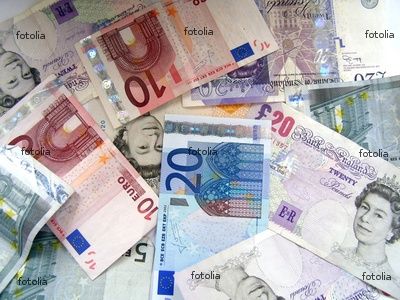
Successive governments, along with the Bank of England, have shown that they are quite incapeable of taking good care of our currency. They’re obviuosly unable to maintain its value. Now, it seems, that dear Merve doesn’t even hide the fact! He wants a weak currency in order to “rebalance the nation’s economy”. What the hell does “rebalance the nation’s economy” mean anyway? It means nothing! These people are just trying to baffle us! What a load of bulldust it is! If these people had balanced the nation’s economy in the first place, they wouldn’t have to try and rebalance it now!
And what’s all this nonsense about quantitative easing? That’s a euphemism for printing money. History tells us where that leads to! It leads to hyperinflation.
It seems to me that neither the government nor the Bank of England are serious about maintaining a stable and valuable pound. People at the top of the banking sector don’t need to care about the pound’s falling value. All they have to do is award themselves hefty bonuses to make up for the lost value of their savings and salaries. For less privileged folk, this is not, alas, a possibility. So, with the pound falling dramatically in value and interest rates remaining very low, and likely to do so for quite some time to come, the people who are becoming poorer and poorer are ordinary folk, i.e. people who do not work in banks! Therefore, perhaps sadly, it is time to get rid of the pound and place our currency into good, safe hands – into the hands of the European Central Bank (ECB).
I, for one, am looking forward to the day when we shall have a stable and desirable currency. The euro must surely be the currency of the future of all European nations. It must surely also be the currency for the future of the United Kingdom, too. So let’s adopt it before we’ll be forced to do so by circumstances beyond our control. By that time the pound sterling may have have become next to worthless. – © Mark
THE TELEGRAPH: Sterling fell to its weakest against the euro in more than 5½ months, pressured after Bank of England Governor Mervyn King said a weak domestic currency was helping to rebalance the nation's economy.
The UK currency also hit a near 2½-month low versus the dollar, stung by Mr King's comment to a regional UK newspaper that sterling's fall "will be helpful" to rebalance the UK economy to one focused more on exports.
While the comments reiterated the central bank's long-held view on the currency and the economy, analysts said the market considered his remarks a good opportunity to wipe out sterling's gains made the previous day.
Sterling had rallied on Wednesday after minutes from the BoE's policy meeting earlier this month showed a unanimous vote not to extend quantitative easing in September.
Market participants said those gains had been overdone, and some analysts said that even though King's comments on Thursday did not offer new insight into the BoE's position on sterling, his statement helped to revive momentum to dump the pound.
"When the market's down on a currency, it will jump on anything that justifies selling it," said Stuart Bennett, currency strategist at Calyon in London.
"Sterling is certainly the whipping boy at the moment."
The euro climbed roughly 1.5pc on the day to 91.53p, its highest since early April. Daily trade volumes surged on the move, with the number of trades executed on the Reuters Dealing system hitting its highest in at least three months.
Thursday's move put the euro on course to posting its best daily performance against the pound since late April. >>> Reuters | Thursday, September 24, 2009
THE TELEGRAPH: The Bank of England has summoned the City's leading economists to an unprecedented meeting in Threadneedle Street, as the pound plunges amid growing confusion over its radical Quantitative Easing (QE) policy.
The Bank will host a seminar of all London's major economists next Tuesday – the first time it has invited them in en masse in recent memory – in what has been construed as a sign that it fears market participants are starting to lose faith in its efforts to pump cash into the economy. The move has also sparked speculation that it is poised to announce a major change to the monetary policy framework, although insiders dismissed such suggestions.
It came after the minutes from the Bank's latest Monetary Policy Committee meeting revealed that the idea of cutting the interest rate banks are paid on the reserves they hold there was not discussed this month. The pound has lurched lower in recent weeks, thanks in part to speculation that the Bank will impose charges on banks for holding excessive amounts of cash in reserve at its vaults. Under QE, it is pumping £175bn into the economy, but much of this cash is sitting in banks' reserve accounts rather than being recycled and flowing around the broader economy.
The suspicion that the Bank will soon take action to mitigate this has pushed down market interest rates sharply and contributed to an almost 5pc fall in the pound against other leading currencies. It has caused gilt prices and short-term interest rates to fluctuate wildly in recent weeks. >>> Edmund Conway and Angela Monaghan | Wednesday, September 23, 2009
Quantitative easing >>>
It’s Time to Adopt the Euro >>> Mark Alexander | Saturday, September 19, 2009